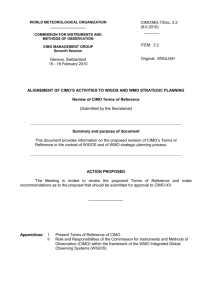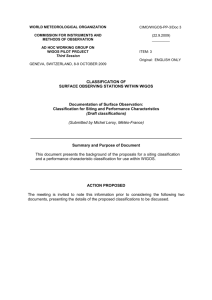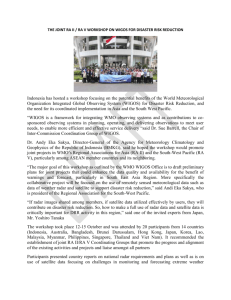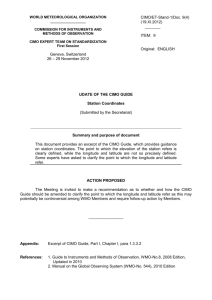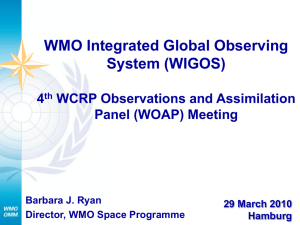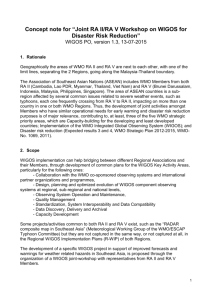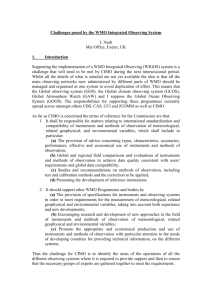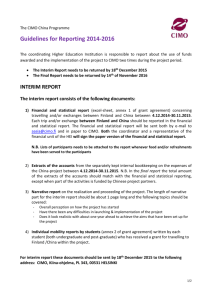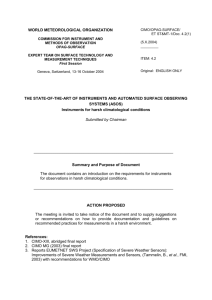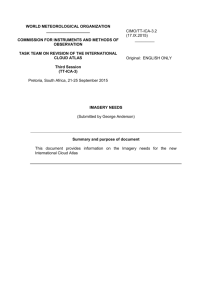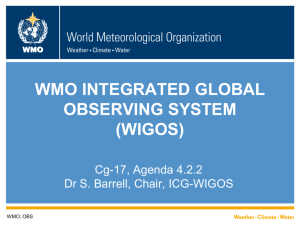Review of Proposed Role and Responsibilities
advertisement
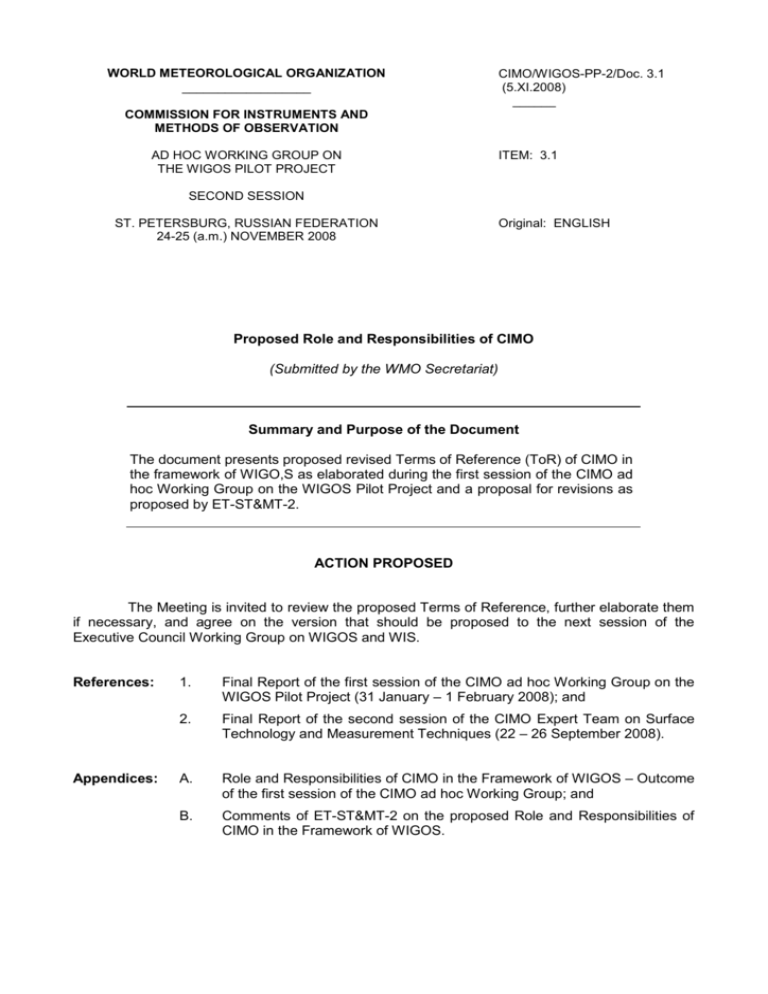
WORLD METEOROLOGICAL ORGANIZATION __________________ CIMO/WIGOS-PP-2/Doc. 3.1 (5.XI.2008) ______ COMMISSION FOR INSTRUMENTS AND METHODS OF OBSERVATION AD HOC WORKING GROUP ON THE WIGOS PILOT PROJECT ITEM: 3.1 SECOND SESSION ST. PETERSBURG, RUSSIAN FEDERATION 24-25 (a.m.) NOVEMBER 2008 Original: ENGLISH Proposed Role and Responsibilities of CIMO (Submitted by the WMO Secretariat) Summary and Purpose of the Document The document presents proposed revised Terms of Reference (ToR) of CIMO in the framework of WIGO,S as elaborated during the first session of the CIMO ad hoc Working Group on the WIGOS Pilot Project and a proposal for revisions as proposed by ET-ST&MT-2. ACTION PROPOSED The Meeting is invited to review the proposed Terms of Reference, further elaborate them if necessary, and agree on the version that should be proposed to the next session of the Executive Council Working Group on WIGOS and WIS. References: Appendices: 1. Final Report of the first session of the CIMO ad hoc Working Group on the WIGOS Pilot Project (31 January – 1 February 2008); and 2. Final Report of the second session of the CIMO Expert Team on Surface Technology and Measurement Techniques (22 – 26 September 2008). A. Role and Responsibilities of CIMO in the Framework of WIGOS – Outcome of the first session of the CIMO ad hoc Working Group; and B. Comments of ET-ST&MT-2 on the proposed Role and Responsibilities of CIMO in the Framework of WIGOS. CIMO/WIGOS-PP-2/Doc. 3.1, APPENDIX A Role and Responsibilities of the Commission for Instruments and Methods of Observation (CIMO) within the framework of the WMO Integrated Global Observing Systems (WIGOS) (Extract from the Final Report of the CIMO ad hoc Working Group on WIGOS, First Session) Within the framework of the WMO Integrated Global Observing Systems (WIGOS). The Commission shall be responsible for matters relating to international standardization, compatibility and sustainability of instruments and methods of observation of meteorological, climatological, hydrological, oceanographic, and related geophysical and environmental variables. This responsibility underpins all observations within WIGOS, and will be carried out in close consultation with relevant WMO partner organizations that co-sponsor, own and/or operate some of the observing systems. This shall include in particular (priority to be defined at later stage): (a) Addressing the requirements across all elements of WIGOS for standardized and compatible observations, including data content, quality and metadata; (b) Providing advice, studies and recommendations concerning effective and sustainable use of instruments and methods of observation, including methods for testing, calibration and quality management consistent with the WMO Quality Management Framework; (c) Conducting and / or coordinating global and regional field intercomparisons and functional testing of instruments and methods of observation; (d) Promoting the development of measurement traceability to recognized international standards, including reference instruments and effective hierarchy of world, regional, national and lead centres for instrument calibration, development and testing; (e) Promoting compatibility, inter-calibration, integration and inter-operability with respect to both, and between, space-based and surface-based (in situ and remotesensing) observations, including conducting testbed observing experiments; (f) Encouraging research and development of new approaches in the field of instruments and methods of observation of meteorological, climatological, hydrological, oceanographic, and related geophysical and environmental variables; (g) Promoting the appropriate and economical production and use of instruments and methods of observation with particular attention to the needs of developing countries; and (h) Supporting training and capacity-building activities in the area of instruments and methods of observation. ____________ CIMO/WIGOS-PP-2/Doc. 3.1, APPENDIX B Comments of CIMO ET MT&ST on the Role and Responsibilities of the Commission for Instruments and Methods of Observation (CIMO) within the framework of the WMO Integrated Global Observing Systems (WIGOS) (Extract from the Final Report of the CIMO ET-ST&MT, Second Session) Within the framework of the WMO Integrated Global Observing Systems (WIGOS). The Commission shall be responsible for matters relating to international standardization, compatibility and sustainability of instruments and methods of observation of meteorological, climatological, hydrological, oceanographic, and related geophysical and environmental variables. This responsibility underpins all observations within WIGOS, and will be carried out in close consultation with relevant WMO partner organizations that co-sponsor, own and/or operate some of the observing systems. This shall include in particular (priority to be defined at later stage): (i) Addressing the requirements across all elements of WIGOS for standardized and compatible observations, including data content, quality and metadata; (j) Providing advice, studies and recommendations concerning effective and sustainable use of instruments and methods of observation consistent with DRR/NDPM, including methods for testing intercomparisons, calibration and quality management consistent with the WMO Quality Management Framework ; (k) Conducting and/or coordinating global and regional field intercomparisons and functional testing checks of instruments and methods of observation; (l) Promoting the development of measurement traceability to recognized international standards, including reference instruments and effective hierarchy of world, regional, national and lead centres for instrument calibration, development and testing**; (m) Promoting compatibility, inter-calibration, integration and inter-operability with respect to both, and between, space-based and surface-based (in situ and remote sensing) observations, including conducting testbed observing experiments; (n) Encouraging research and development of new approaches in the field of instruments and methods of observation of meteorological, climatological, hydrological, oceanographic, and related geophysical and environmental variables; (o) Promoting the appropriate and economical production and use of instruments and methods of observation with particular attention to the needs of developing countries; and (p) Supporting training and capacity-building activities in the area of instruments and methods of observation. ** It is not known whether CIMO can provide guidelines for instrument development and test. ____________

